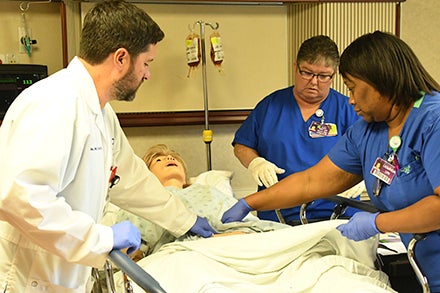Memorial Hospital hosts ObGyn project training
Published 5:02 pm Tuesday, November 6, 2018
Perinatal outreach educator Kathy Brinson held a training seminar for OBGYNs Tuesday at Memorial Hospital and Manor, where they were refreshed on what to do in postpartum hemorrhaging situations.
Memorial Hospital and Manor received a grant and is now part of the Georgia Perinatal Quality Collaborative, which works together to improve the quality of care and outcomes for Georgia’s mothers and babies. One of the benefits to being a member of GaPQC is access to quality improvement training.
For Brinson’s training she brought in a simulated mother, who was hemorrhaging after giving birth to her newborn. Dr. Wayne Friedman was the doctor on call and had to handle the situation, as if this were a real life scenario.
Once Dr. Friedman realized his patient was hemorrhaging, he called in for additional nurses, who brought in a postpartum hemorrhage cart. The cart is designed to have everything that would be necessary in a hemorrhaging situation. The cart anticipates the situation happening, so that nurses and doctors are prepared and can take better care of their patients.
The cart in Tuesday’s simulation did not have a scale, but nurse Judy Godwin said they are created to have a 4 x 4 scale, so they can weigh exactly how much blood was lost during the hemorrhage.
Godwin explained that if a mother loses 500 mL, she has hemorrhaged, but if she loses up to 1,000 mL, she can need a blood transfusion, among other additional help.
“We used to estimate how much blood they had lost,” Dr. Friedman said. “But, this quantifies and helps us understand who needs our help and attention immediately.”
Godwin said one of the biggest reasons for postpartum hemorrhaging is uterine tone. ‘The tone could be weaker due to drug usage or multiple babies. Women who have had more than four babies tend to bleed more. Women could also have placental debris, which can cause clotting or a hemorrhage.
Because of this, nurses will come back to check new mother’s hemoglobin often, along with blood pressure to make sure nothing seems out of the ordinary.
“You would not expect a football team to be perfect after one drill,” Brinson said. “This is why we keep practicing this, so it can point out what we need improvement on.”
The team of nurses and staff who participated in Tuesday’s simulation have admitted they have seen very few hemorrhages over their time at Memorial Hospital and Manor, so they recognize the importance of keeping up to date on this information and checking the new mother, because they know hemorrhaging is always a great risk.
As members of the GaPQC, the staff will continue to work and be at the forefront of mother and baby care and take all measures to make sure everyone is happy and healthy.






